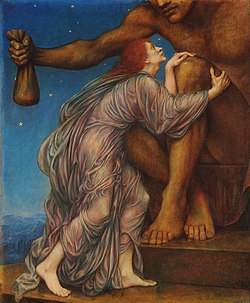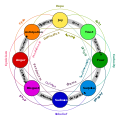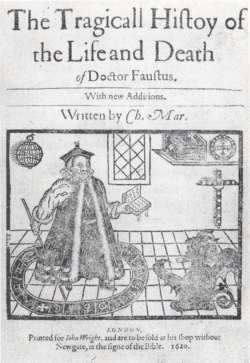Greed

| Part of a series on |
| Emotions |
|---|
  |


Greed (or avarice, Latin: avaritia) is an insatiable desire for material gain (be it food, money, land, or animate/inanimate possessions) or social value, such as status, or power.
Nature of greed
The initial motivation for (or purpose of) greed and actions associated with it may be the promotion of personal or family survival. It may at the same time be an intent to deny or obstruct competitors from potential means (for basic survival and comfort) or future opportunities; therefore being insidious or tyrannical and having a negative connotation. Alternately, the purpose could be defense or counteractive response to such obstructions being threatened by others.
Modern economic thought frequently distinguishes greed from self-interest, even in its earliest works, and spends considerable effort distinguishing the line between the two. By the mid-19th century – affected by the phenomenological ideas of Hegel – economic and political thinkers began to define greed inherent to the structure of society as a negative and inhibitor to the development of societies. Keynes wrote, "The world is not so governed from above that private and social interest always coincide. It is not so managed here below that in practice they coincide." Both views continue to pose fundamental questions in today's economic thinking.
Weber posited that the spirit of capitalism integrated a philosophy of avarice coloured with utilitarianism. Weber also says that, according to Protestant ethic, "Wealth is thus bad ethically only in so far as it is a temptation to idleness and sinful enjoyment of life, and its acquisition is bad only when it is with the purpose of later living merrily and without care."
As a secular psychological concept, greed is an inordinate desire to acquire or possess more than one needs. The degree of inordinance is related to the inability to control the reformulation of "wants" once desired "needs" are eliminated. It is characterized by an insatiable desire for more, but also a dissatisfaction with what one currently has. Erich Fromm described greed as "a bottomless pit which exhausts the person in an endless effort to satisfy the need without ever reaching satisfaction". An individual's tendency to be greedy can be seen as a personality trait that can be measured. With measures like these, greed has been found to be related to financial behavior (both positive in earning and negative in borrowing/saving less), to unethical behavior, and to negatively relate to well-being.
Views of greed
In animals
Animal examples of greed in literary observations are frequently the attribution of human motivations to other species. The dog-in-the-manger, or piggish behaviors are typical examples. Characterizations of the wolverine (whose scientific name (Gulo gulo) means "glutton") remark both on its outsized appetite, and its penchant for spoiling food remaining after it has gorged.
Ancient views
Ancient views of greed abound in nearly every culture. In Classical Greek thought; pleonexy (an unjust desire for tangible/intangible worth attaining to others) is discussed in the works of Plato and Aristotle. Pan-Hellenic disapprobation of greed is seen by the mythic punishment meted to Tantalus, from whom ever-present food and water is eternally withheld. Late-Republican and Imperial politicians and historical writers fixed blame for the demise of the Roman Republic on greed for wealth and power, from Sallust and Plutarch to the Gracchi and Cicero. The Persian Empires had the three-headed Zoroastrian demon Aži Dahāka (representing unslaked desire) as a fixed part of their folklore. In the Sanskrit Dharmashastras the "root of all immorality is lobha (greed).", as stated in the Laws of Manu (7:49). In early China, both the Shai jan jing and the Zuo zhuan texts count the greedy Taotie among the malevolent Four Perils besetting gods and men. North American Indian tales often cast bears as proponents of greed (considered a major threat in a communal society). Greed is also personified by the fox in early allegoric literature of many lands.
Greed (as a cultural quality) was often imputed as a racial pejorative by the ancient Greeks and Romans; as such it was used against Egyptians, Punics, or other Oriental peoples; and generally to any enemies or people whose customs were considered strange. By the late Middle Ages the insult was widely directed towards Jews.
In the Books of Moses, the ten commandments of the sole deity are written in the book of Exodus (20:2-17), and again in Deuteronomy (5:6-21); two of these particularly deal directly with greed, prohibiting theft and covetousness. These commandments are moral foundations of not only Judaism, but also of Christianity, Islam, Unitarian Universalism, and the Baháʼí Faith among others. The Quran advises do not spend wastefully, indeed, the wasteful are brothers of the devils..., but it also says do not make your hand [as though] chained to your neck..." The Christian Gospels quote Jesus as saying, ""Watch out! Be on your guard against all kinds of greed; a man's life does not consist in the abundance of his possessions", and "For everything in the world—the lust of the flesh, the lust of the eyes, and the pride of life—comes not from the Father but from the world.".
Aristophanes
In the Aristophanes satire Plutus, an Athenian and his slave say to Plutus, the god of wealth, that while men may become weary of greed for love, music, figs, and other pleasures, they will never tire of greed for wealth:
Lucretius
The Roman poet Lucretius thought that the fear of dying and poverty were major drivers of greed, with dangerous consequences for morality and order:
Epictetus
The Roman Stoic Epictetus also saw the dangerous moral consequences of greed, and so advised the greedy to instead take pride in letting go of the desire for wealth, rather than be like the man with a fever who cannot drink his fill:

St. Ambrose
In his exegesis on Naboth (De Nabute, 389) Ambrose of Milan writes "omnium est terra, non diuitam, sed pauciores qui non utuntur suo quam qui utuntur", translated by Pope Paul VI as " The earth belongs to everyone, not only to the rich." His belief is that our concern for one another is the force which creates society and holds it together; and that avarice destroys this bond. "
Ancient China
Laozi, the semi-legendary founder of Taoism, was critical of the desire for profit over social good. In the Tao Te Ching, Laozi observes that "the more implements to add to their profit that the people have, the greater disorder is there in the state and clan."
Xunzi believed that selfishness and greed were fundamental aspects of human nature and that society must endeavor to suppress these negative tendencies through strict laws. This belief was the basis of legalism, a philosophy that would become the prevailing ideology of the Qin dynasty and continues to be influential in China today.
Conversely, the philosopher Yang Zhu was known for his embrace of total self-interest. However, the school of Yangism did not specifically endorse greed; rather, it emphasized a form of hedonism where individual well-being takes precedence over all else.
Mencius was convinced of the innate goodness of human nature, but nevertheless warned against the excessive drive towards greed. Like Laozi, he was worried about the destabilizing and destructive effects of greed: "In a case where the lord of a state of ten thousand chariots is murdered, it must be by a family with a thousand chariots. In a case where the lord of a state of a thousand chariots is murdered, it must be by a family with a hundred chariots. One thousand out of ten thousand, or one hundred out of a thousand, cannot be considered to not be a lot. But if righteousness is put behind and profit is put ahead, one will not be satisfied without grasping [from others]."
Medieval Europe
Augustine
In the fifth century, St. Augustine wrote:
Aquinas
St. Thomas Aquinas states greed "is a sin against God, just as all mortal sins, in as much as man condemns things eternal for the sake of temporal things." He also wrote that greed can be "a sin directly against one's neighbor, since one man cannot over-abound (superabundare) in external riches, without another man lacking them, for temporal goods cannot be possessed by many at the same time."
Dante
Dante's 14th century epic poem Inferno assigns those committed to the deadly sin of greed to punishment in the fourth of the nine circles of Hell. The inhabitants are misers, hoarders, and spendthrifts; they must constantly battle one another. The guiding spirit, Virgil, tells the poet these souls have lost their personality in their disorder, and are no longer recognizable: "That ignoble life, Which made them vile before, now makes them dark, And to all knowledge indiscernible." In Dante's Purgatory, avaricious penitents were bound and laid face down on the ground for having concentrated too much on earthly thoughts.
Chaucer
Dante's near-contemporary, Geoffrey Chaucer, wrote of greed in his Prologue to The Pardoner's Tale these words: "Radix malorum est Cupiditas" (or "the root of all evil is greed"); however the Pardoner himself serves us as a caricature of churchly greed.
Early modern Europe
Luther
Martin Luther especially condemned the greed of the usurer:
Montaigne
Michel de Montaigne thought that 'it is not want, but rather abundance, that creates avarice', that 'All moneyed men I conclude to be covetous', and that:
Spinoza
Baruch Spinoza thought that the masses were concerned with money-making more than any other activity, since, he believed, it seemed to them like spending money was prerequisite for enjoying any goods and services. Yet he did not consider this preoccupation to be necessarily a form of greed, and felt that the ethics of the situation were nuanced:
Locke
John Locke claims that unused property is wasteful and an offence against nature, because "as anyone can make use of to any advantage of life before it spoils; so much he may by his labour fix a property in. Whatever is beyond this, is more than his share, and belongs to others."
Laurence Sterne
In the Laurence Sterne novel Tristram Shandy, the titular character describes his uncle's greed for knowledge about fortifications, saying that the 'desire of knowledge, like the thirst of riches, increases ever with the acquisition of it', that 'The more my uncle Toby pored over his map, the more he took a liking to it', and that 'The more my uncle Toby drank of this sweet fountain of science, the greater was the heat and impatience of his thirst'.
Rousseau
The Swiss philosophe Jean-Jacques Rousseau compared man in the state of nature, who has no need of greed since he can find food anywhere, with man in the state of society:
Adam Smith
Political economist Adam Smith thought the greed for food to be limited, but the greed for other goods to be limitless:
Edward Gibbon
In his account of the Sack of Rome, historian Edward Gibbon remarks that:
Modern period
John Stuart Mill
In his essay Utilitarianism, John Stuart Mill writes about greed for money that:
Goethe

In Johann Wolfgang von Goethe's tragic play Faust, Mephistopheles, disguised as a starving man, comes to Plutus, Faust in disguise, to recite a cautionary tale about avariciously living beyond your means:
Near the end of the play, Faust confesses to Mephistopheles:
That's the worst suffering can bring,
Being rich, to feel we lack something.
Marx
Karl Marx thought that 'avarice and the desire to get rich are the ruling passions' in the heart of every burgeoning capitalist, who later develops a 'Faustian conflict' in his heart 'between the passion for accumulation, and the desire for enjoyment' of his wealth. He also stated that 'With the possibility of holding and storing up exchange-value in the shape of a particular commodity, arises also the greed for gold' and that 'Hard work, saving, and avarice are, therefore, [the hoarder's] three cardinal virtues, and to sell much and buy little the sum of his political economy.' Marx discussed what he saw as the specific nature of the greed of capitalists thusly:
Meher Baba
Meher Baba dictated that "Greed is a state of restlessness of the heart, and it consists mainly of craving for power and possessions. Possessions and power are sought for the fulfillment of desires. Man is only partially satisfied in his attempt to have the fulfillment of his desires, and this partial satisfaction fans and increases the flame of craving instead of extinguishing it. Thus, greed always finds an endless field of conquest and leaves the man endlessly dissatisfied. The chief expressions of greed are related to the emotional part of man."
Paul VI / John Paul II
In 1967, Pope Paul VI issued the encyclical Populorum progressio which called for "a joint effort for the development of the human race as a whole." He warned that "the exclusive pursuit of material possessions prevents man's growth as a human being and stands in opposition to his true grandeur. Avarice, in individuals and in nations, is the most obvious form of stultified moral development." Twenty years later, in the last days of 1987, Pope John Paul II published the encyclical Sollicitudo rei socialis. Among the pronouncements was this: "Among the actions and attitudes opposed to God’s will two are very typical: greed and the thirst for power. Not only individuals sin in that way; so do nations and world-blocs."
Ivan Boesky
American Ivan Boesky famously defended greed in an 18 May 1986 commencement address at the UC Berkeley's School of Business Administration, in which he said, "Greed is all right, by the way. I want you to know that. I think greed is healthy. You can be greedy and still feel good about yourself". This speech inspired the 1987 film Wall Street, which features the famous line spoken by Gordon Gekko: "Greed, for lack of a better word, is good. Greed is right, greed works. Greed clarifies, cuts through, and captures the essence of the evolutionary spirit. Greed, in all of its forms; greed for life, for money, for love, knowledge has marked the upward surge of mankind."
David Klemm
The theologian David Klemm summarized Augustine to stress his view that a need-love for earthly things was dangerous: "Most people... become attached to their objects of desire, and in this way are in fact possessed by them", needing and dependent. It is, Klemm says elsewhere, "a window-shopping of the soul in which I lose myself in desires for shallow and untrue goods". But "those who use their private property for the sake of enjoying God become detached from their goods and thereby possess them well".
Inspirations
Scavenging and hoarding of materials or objects, theft and robbery, especially by means of violence, trickery, or manipulation of authority are all actions that may be inspired by greed. Such misdeeds can include simony, where one profits from soliciting goods within the actual confines of a church. A well-known example of greed is the pirate Hendrick Lucifer, who fought for hours to acquire Cuban gold, becoming mortally wounded in the process. He died of his wounds in 1627, hours after having transferred the booty to his ship.
Genetics
Some research suggests there is a genetic basis for greed. It is possible people who have a shorter version of the ruthlessness gene (AVPR1a) may behave more selfishly.
Art
In 1558, Pieter van der Heyden personified greed in his engraved image after drawings by Pieter Bruegel the Elder. More recently, artists like Umberto Romano (1950), Michael Craig-Martin (2008) and Diddo (2012) have devoted works of art to greed.
In popular culture
- American Greed, documentary series
- Greed (1924 film)
- Greed (2019 film)
- Greed (game show)
- Ojukokoro (Greed), film
- Greed, novel
See also
Further reading
- Bossuet, Jacques-Bénigne (1900). . The Sermon on the Mount. Longmans, Green, and Co.
- Cassian, John (1885). . Ante-Nicene Christian Library, Volume XI. Translated by Philip Schaff. T. & T. Clark in Edinburgh.
- Padua, St. Anthony of (1865). . The Moral Concordances of Saint Anthony of Padua. J.T. Hayes.
- Vianney, Jean-Marie-Baptiste (1951). . The Blessed Curé of Ars in His Catechetical Instructions. St. Meinrad, Ind.
- Seuntjens, Terri; Zeelenberg, Marcel; Breugelmans, Seger; Van de Ven, Niels (2015). "Defining Greed". British Journal of Psychology. 106 (3): 505–525. doi:10.1111/bjop.12100. PMID 25315060. S2CID 25323046.